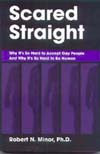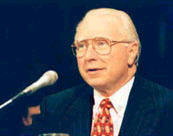 |


|
|
Just as Good Isn't Good Enough |
|
By Bob Minor Minor Details The American Academy of Pediatrics' endorsement and support this past month of the rights of gay men and lesbians to be parents is a prestigious validation of what we've known all along. We can be just as good at parenting as straight people.
 The Gallucios: Gay couple Jon and Micahel with children Madison and Adam
The Gallucios: Gay couple Jon and Micahel with children Madison and Adam
Photo: Song of Myself And, we can also be just as bad. The AAP statement is another one of those endorsements that identifies us with the same healthy, and the same sick, institutions as the rest of society. No doubt, we have the right to all of those institutions. Not only does the AAP join the American Psychological Association and the American Academy of Child and Adolescent Psychiatry in support of lesbian and gay parenting, but it also takes a step further. The Academy calls its member doctors to become advocates for full recognition of such parenting in order to promote the health and wellbeing not of LGBT parents, but of American children. Of course, lesbians and gay men have been parents for generations. In "don't ask, don't tell" fashion, however, their parental rights have been denied in U.S. courts with the belief that "scientific evidence" did not support their abilities. A recent Alabama example is only the latest. Right-wing responses still cling to those old prejudices, criticizing AAP recommendations with the same complaints they make of any professional organization that doesn't agree with their prejudices - that the decision was political, or under activist pressure, or based on flawed data.
It's the same old rhetoric from groups whose own methods are politically heavy-handed, who are adept at using every form of activist pressure, and who cite "data" from organizations falsely self-labeled "research councils" as well as "researchers" known for skewing the results. Of course, the support of the right of LGBT people to parent does not guarantee that LGBT people will be good parents any more than the right of heterosexuals to parent has guaranteed that what they do is good for their children. After all, the concept of the dysfunctional family was based on straight family models. And the generations that baby boomers complain about for the loss of morals and whatever else they think is good, were the result of the straight parenting of baby boomers or their own straight parents. The failure of the current model of a family is something that's hardly ever noticed, much less discussed, in our society. We are too stuck in this family model's patterns, too committed to its structure, too invested financially in its dysfunction. On top of this, many are too busy blaming the gains of LGBT people for the problems that a straight society and its problematic model of a family have created. Most non-heterosexual people are too caught up in the important fight for equal rights, too quick to accept the idea that straight institutions are better, or too much in need of the approval of straight society to raise and examine the issue.
We have no need to go into parenting as if we are the flawed ones who need to catch up to the healthy straight families. We are the ones capable of changing things for the better, because we are not straight. And we can join that small cohort of heterosexual parents who are fighting to change how our society brings up boys to be men and girls to be ladies. We've already begun to break the limitations of the nuclear family when we've brought our friends into a child's life as non-related "aunts and uncles." We've created groups to support our parenting - straight people should have done this long ago to relieve parental stress. Some of us will choose to nurture life directly with children whom we conceive, birth, or adopt. We need to recognize, then, that these lives are not here to be our property or one of our possessions, but lives that need to grow in their own space and time for themselves. We have chosen to help them flourish. The have not chosen us. Some of us could choose to nurture the children who are in this world rather than think our fulfillment might lie in having children of our own. This world needs nurturing adults who supplement parents and give children the attention they need, attention that goes beyond the limitations of two adults. All of us can refuse to limit boys by the stifling gender roles that put men out of touch with, even embarrassed by, their feelings, prepare them to be competitive warriors who can only win by defeating other men in business, sports, war, and every-day interactions. We can encourage their nurturing, peace-making, and playful qualities. We can refuse to limit girls by the stifling gender roles that encourage them to accept chivalry rather than equal pay, teach them to sacrifice their dreams for the dreams of others, and settle for the evaluations of male-dominance. We can encourage them to define their lives for themselves and their own interests, and to develop and display their strength, insights, and wholeness. We can emphasize alternatives to punishment, shame, and the appearance that adults know it all. We can decide to learn what children can teach us. Of course, this all sounds pretty queer to many in our society. But that's exactly the point. If, in spite of the dominant propaganda, we can see what LGBT people have to give to children, we'll stop aping the old tired models of parenting and find out that the alternatives are even better for children. And though some of this is already recommended by the American Academy of Pediatrics, one day they'll more fully catch up to us.  Robert N. Minor is author of Scared Straight: Why It's So
Hard to Accept Gay People and Why It's So Hard to Be Human and
Professor of Religious Studies at the University of Kansas. He may be
reached at Minor@libertypress.net.
Robert N. Minor is author of Scared Straight: Why It's So
Hard to Accept Gay People and Why It's So Hard to Be Human and
Professor of Religious Studies at the University of Kansas. He may be
reached at Minor@libertypress.net.
|

© 1997-2002 BEI
 The Rev. Lou Sheldon: Doesn't care what the evidence says
The Rev. Lou Sheldon: Doesn't care what the evidence says